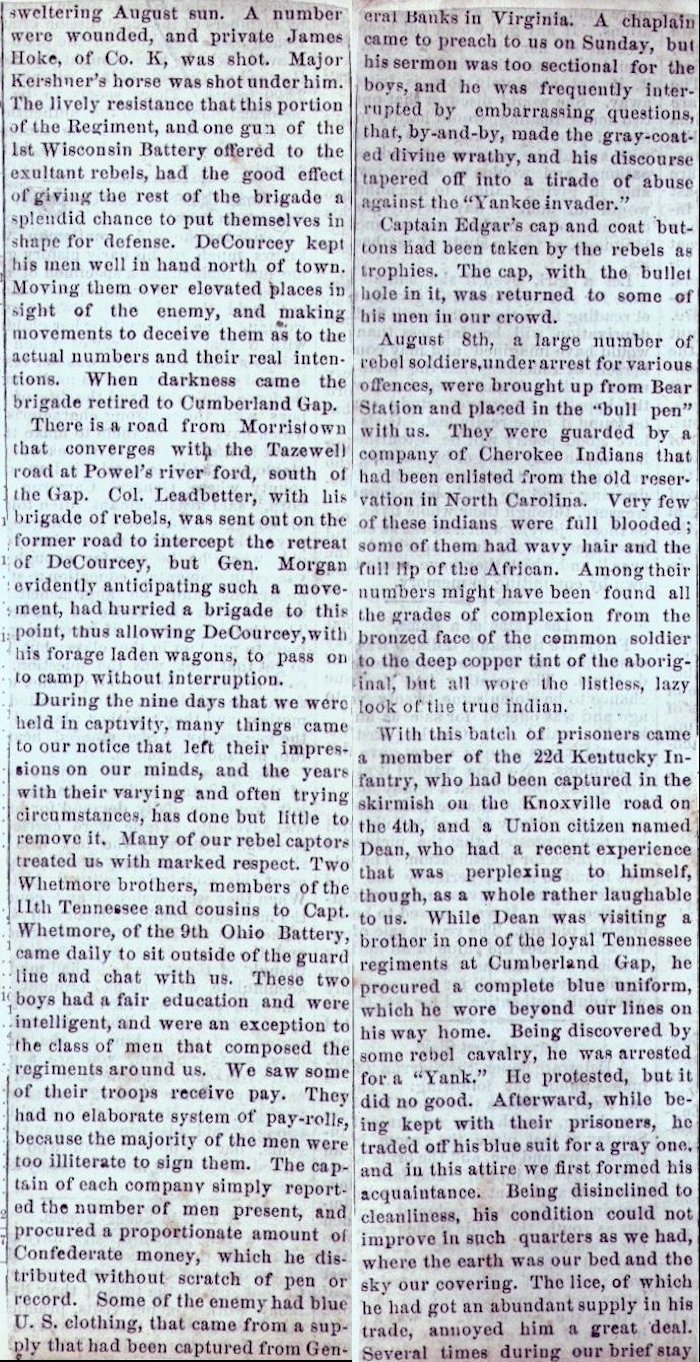| Camp & Field Page 28 | Camp & Field Index Page | 16th OVI Home Page | Camp & Field Page 30 |
The Camp & FieldArticles by Theodore Wolbach |
 Cpl. Theodore D. Wolbach |
The following image is taken from a book titled "Mortality and Statistics of the Census of 1850" in which it is believed retired Captain Rezin H. Vorhes, Company H, pasted over the pages a series of articles written by Cpl. Theodore D. Wolbach, Company E, titled "Camp and Field" and published, by chapter, in the Holmes County (Ohio) Republican newspaper from February 24, 1881 to August 17, 1882. The articles tell the story, in great detail and color, of the 16th OVI, from the inception of the 3-year regiment in October, 1861, through all its camps, battles and marches until it was disbanded on October 31, 1864. The articles pasted in the Vorhes book cover the first 35 chapters, published through October 20, 1881. All the remaining chapters were recently found in a Holmes County library by researcher Rob Garber who obtained copies, performed the transcriptions and provided to this website and which are also presented here, thus providing the complete work by Theodore Wolbach.
Throughout these articles click on the underlined white text for additional details.
The webauthor thanks 16th Ohio descendant Rob Garber for his excellent research on the Camp And Field articles and for performing the tedious digital transcription of those articles found on each page. The transcriptions were made to reflect the original articles verbatim, misspellings and all. Rob is the 3rd great nephew of Capt. William Buchanan, Company F, 16th Ohio, who served in the 90-day regiment as a private, re-enlisting in the three year regiment, and eventually making the rank of Captain of Company F. Thanks Rob!
Page 29 - Chapter 17 - August, 1862
 |
sweltering August sun. A number were wounded, and private James Hoke, of Co. K, was shot. Major Kershner's horse was shot under him. The lively resistance that this portion of the Regiment, and one gun of the 1st Wisconsin Battery offered to the exultant rebels, had the good effect of giving the rest of the brigade a splendid chance to put themselves in shape for defense. DeCourcey kept his men well in hand north of town. Moving them over elevated places in sight of the enemy, and making movements to deceive them as to the actual numbers and their real intentions. When darkness came the brigade retired to Cumberland Gap. There is a road from Morristown that converges with the Tazewell road at Powel's river ford, south of the Gap. Col. Leadbetter, with his brigade of rebels, was sent out on the former road to intercept the retreat of DeCourcey, but Gen. Morgan evidently anticipating such a movement, had hurried a brigade to this point, thus allowing DeCourcey, with his forage laden wagons, to pass on to camp without interruption. During the nine days that we were held in captivity, many things came to our notice that left their impressions on our minds, and the years with their varying and often trying circumstances, has done but little to remove it. Many of our rebel captors treated us with marked respect. Two Whetmore brothers, members of the 11th Tennessee and cousins to Capt. Whetmore, of the 9th Ohio Battery, came daily to sit outside of the guard line and chat with us. These two boys had a fair education and were intelligent, and were an exception to the class of men that composed the regiments around us. We saw some of their troops receive pay. They had no elaborate system of pay-rolls, because the majority of the men were too illiterate to sign them. The captain of each company simply reported the number of men present, and procured a proportionate amount of Confederate money, which he distributed without scratch of pen or record. Some of the enemy had blue U.S. clothing, that came from a supply that had been captured from Gen- |
eral Banks in Virginia. A chaplain came to preach to us on Sunday, but his sermon was too sectional for the boys, and he was frequently interrupted by embarrassing questions that, by-and-by, made the gray-coated divine wrathy, and his discourse tapered off into a tirade of abuse against the Captain Edgar's cap and coat buttons had been taken by the rebels as trophies. The cap, with the bullet hole in it, was returned to some of his men in our crowd. August 8th, a large number of rebel soldiers, under arrest for various offences, were brought up from Bear Station and placed in the With this batch of prisoners came a member of the 22d Kentucky Infantry, who had been captured in the skirmish on the Knoxville road on the 4th, and a Union citizen named Dean, who had a recent experience that was perplexing to himself, though, as a whole rather laughable to us. While Dean was visiting a brother in one of the loyal Tennessee regiments at Cumberland Gap, he procured a complete blue uniform, which he wore beyond our lines on his way home. Being discovered by some rebel cavalry, he was arrested for a |
| Camp & Field Page 28 | Camp & Field Index Page | 16th OVI Home Page | Camp & Field Page 30 |